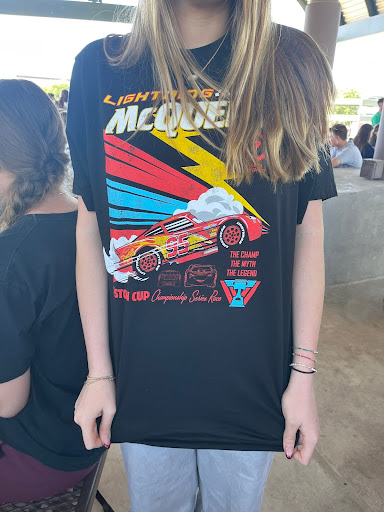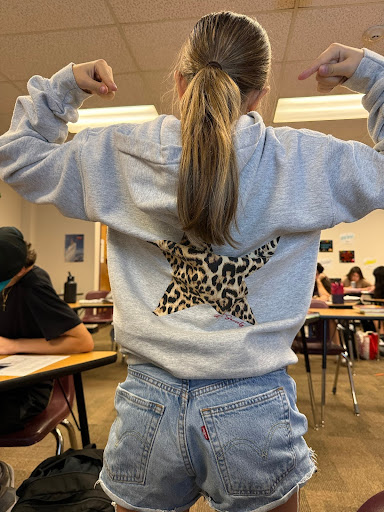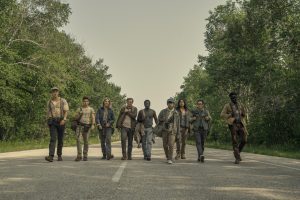
The Long Walk was a book written in 1979 by a young Stephen King, although back then he went under the pseudonym of Richard Bachman. He wrote the book as a sort of allegory to the Vietnam War. The novel is a brisk 384 pages following 100 teenage boys who were chosen to— well, to walk. The boys were required to walk at a consistent pace of at least 4 miles per hour without stopping until there was only one of them left. If they stopped, for any reason at all, for a certain period of time, they would be shot and killed on the spot. They would earn their ticket. In the book, when one of the characters was shot, it was noted as them “earning their ticket.” Presumably, this meant their ticket out of the walk. They were killed, so they couldn’t exactly compete anymore. With only three warnings, the boys are forced to starve, ration, tire, and walk for days, rain or snow—day or night— as Pete says in the film, “This is walk or die.” In The Long Walk, the only way out is through, and only one of them can really escape.
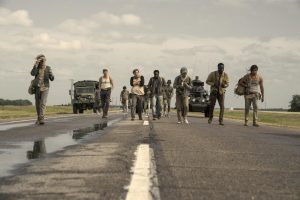
The Long Walk follows a similar theme to that of Susanne Collins, The Hunger Games, though Stephen King’s version came out long before. Recently, Lionsgate Studios adapted the book into a film. An absolutely brilliant one at that. Stephen King had two major conditions for Lionsgate if the studio wanted to adapt his novel. He said that one; they had to show every single person’s ticket. As I stated prior, King wrote the book as an allegory for the Vietnam War— about how people would be drafted and they wouldn’t come home. He said that gun violence wasn’t shied away from back then; people died, and it was brutal. He wanted the film to be as gore-infused as possible— there’s no sugarcoating it. Stephen’s other condition was that they had to change the pace from four miles per hour to three. This turned out to be a pretty smart move considering most fans of the books believed it to be almost inconceivable and impossible to walk that long at such a pace.
I’ve been trying to figure out exactly how I feel about this movie in the days since I watched it— and the truth is? I can’t. There’s so much I’ve still yet to comprehend. It was such a complex movie with beautifully written characters— and don’t even get me started on that ending. I went into the cinema planning on not getting attached to any of the characters since I knew that it was a horror movie—Stephen King at that— so I was prepared for the scares and the brutality of it all. At least I thought I was.
I genuinely cannot express my love for this film. It easily takes first place in my roster of favorite movies, and the funny thing? I didn’t even think I would like it that much. I honestly thought that it would bore me to tears. I mean— a movie about people walking? How could they possibly make it entertaining 100% of the time? Well, I don’t know how, but this movie surpassed my expectations by more than a long shot. I was completely engrossed the entire time. I could hardly take my eyes off the screen. I mean, somehow they managed to weave themes of comedy, demise, and heart-
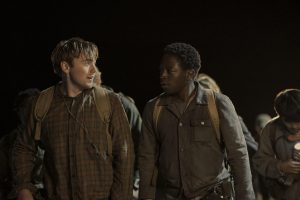
wrenching tragedy all into one film. There were times that I, and the entire theater with me, were laughing and then the next second someone would be killed off. At the same time, throughout the entire second half of the movie, I was bawling my eyes out. There was truly never a dull moment within this film.
The writers made it nearly impossible not to get attached to the characters— I even wound up falling in love with the character who’d been portrayed as a complete bully to the others. Each character was so carefully crafted and intricately written that not becoming attached wasn’t even a possibility. This, of course, only made the film more harrowing, taking into account that only one of them could win.
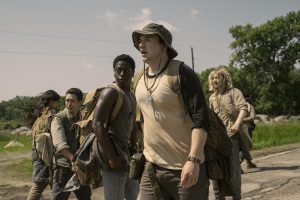
There weren’t too many changes regarding the book-to-film narration— but a few others included altering the age range of the boys, and the number of participants in the contest. In the book, the boys were all between the ages of 13 and 19, whereas in the film, they had to be over eighteen to apply. This was changed because of the limited hours to which minors are allowed to work, and also to ease the blow a little bit. There are a lot of people out there who probably would have skipped out on the film if they’d been signing up to watch a bunch of kids getting brutally murdered. As far as the second change goes, they switched the number of participants from one hundred to fifty because they (rightfully) thought it would be easier to film with less cast. Getting 100 people to commit to their roles and walk along a trail for days in the grueling heat would have been incredibly difficult to manage, so ultimately changing the number to fifty would make for a better film.
However, they did manage to include many of the original characters who had been cut out, through other characters in the film. Scramm was an original character in the book who had unfortunately not made the cut to remain in the movie. The main attribute of his character was how, back at home, he had a wife and child on the way. This character was not included in the movie adaptation, but he was alluded to in another character by the name Hank Olsen, who was said to have had a wife named Clementine back at home. Now, it was never confirmed that she was pregnant, though many viewers do believe that to be true. They may have cut down the cast, but the original one hundred will never be forgotten.
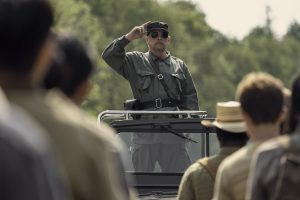
This film has stuck with me like no other. If I’m being completely and utterly honest, I have never experienced a movie like this before. I haven’t been able to stop thinking about it since I left that theater three days ago. It’s almost like it’s haunting me, but the weird thing is, it’s not because of the horror and macabre scenes displayed throughout— no, it’s because of the message. The meaning. There is so much more to this film than just fifty men walking along a trail. There’s more to it than even the allegory to the war. It’s all about perception, and everyone perceives things in completely different ways. Cooper Hoffman, who played Ray in the movie, said in an interview that he thought it was kind of hinting at the walk through life.
People are born, and then they walk. They walk through their experiences, they make friends, they make enemies— and then they die. Everyone has to die. Somehow, someway, it always happens, there is no escaping it. This film has so many hidden meanings, so many things that it could be alluding to— and that’s why it’s truly all about perception. It’s different to each individual person and that’s what makes it so unconditionally brilliant.
Now, I’d like to take a moment to appreciate Jeremiah Fraites who scored this movie. He’s the one who created the music and the soundtrack for The Long Walk, which really made it all the better. Impressively, this was his first time scoring. I think one of the many reasons this film was so incredible was because of the soundtrack— it definitely would not have hit the same if it hadn’t been there. With futuristic undertones and sad— but somehow also hopeful and uplifting melodies, this soundtrack was truly impossible to beat.
The costuming is another thing that essentially made this film. With dull, and earthy colors that, in a sense, referred back to what common soldiers in the military would wear? It made that connection from The Long Walk to the Vietnam War drastically easier to spot, but at the same time, still not exactly visible to the naked eye. That’s precisely why I’m so incredibly fond of this movie— because it forces the audience to think. It moves them to perceive things in the way that they do, and to theorize and make sense of things. There are sort of hidden figures throughout the film, things that you won’t see unless you’re paying very close attention and sometimes even then they can be missed.
From where I stand, The Long Walk is absolutely the best executed novel-to-film adaptation I’ve witnessed in years, and trust me when I say, I’ve seen a lot of them. This movie had me laughing, frightened, and somehow also managed to leave me sobbing even two hours after it ended. The cast, the crew, the book— unquestionably, The Long Walk is the best adaptation to have come out all year, and just like so many in the movie, I will die on that hill.







